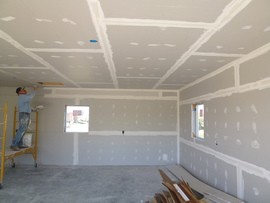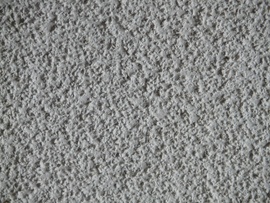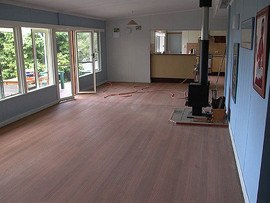How Much Does It Cost to Install Drywall Ceiling?
Drywall, also known as plasterboard or gypsum board, is a versatile material used for various applications, including ceilings. Drywall ceilings are trendy because they offer a clean, finished look while offering fire-resistant and soundproof properties. Drywall is lightweight and easy to cut, making it an ideal material for ceiling installation. It is also relatively inexpensive and easy to find.
The national average drywall ceiling installation is between $400 and $1,200. Most homeowners spend $700 to install ⅝-inch fire-resistant drywall ceiling in a 280 sq.ft. living room. At the low end of the spectrum, you can spend $60 to install ½-inch standard drywall ceiling in a 40 sq.ft. hallway. At the high end, you can pay up to $14,000 to remove the old drywall ceiling and install a new ⅝-inch soundproof drywall ceiling in a 2,000 sq.ft. basement.
Drywall Ceiling Installation Prices
| Drywall Ceiling Installation Cost | |
|---|---|
| National average cost | $700 |
| Average range | $400-$1,200 |
| Low-end | $60 |
| High-end | $14,000 |
In this guide
Average Cost to Install Drywall Ceiling by Size
Cost to Hang Drywall on Ceiling by Type
Cost to Put Up Drywall Ceiling by Location
Labor Cost to Install Drywall Ceiling
Labor Cost to Hang and Finish Drywall Ceiling
Cost to Install Suspended Drywall Ceiling
Cost of Replacing Ceiling Drywall
Cost to Replace Drop Ceiling With Drywall
Cost to Install Drywall Over Popcorn Ceiling
Best Drywall Thickness for Ceilings
Additional Considerations
FAQs
Drywall Ceiling Installation Cost by Project Range
Drywall Ceiling Cost per Square Foot
The average drywall ceiling price is between $1.50 and $6.65 per sq.ft. installed. Simple ceilings made with standard drywall panels cost less. More complex ceilings made with specialty panels come at a higher price. The cost of drywall ceilings varies depending on the size of the room, the type of drywall used, and the job's complexity. Standard drywall panels are the cheapest option. Fire-resistant and mold-resistant panels are more expensive. Finally, the size affects the cost. Larger rooms require more material and labor and are more expensive to install.
Average Cost to Install Drywall Ceiling by Size
The ceiling drywall cost depends on the size, with prices ranging between $10 and $25 per board. Installation costs $55 to $185 per board. The installation cost is higher than installing drywall on walls because bringing the heavy panels up towards the ceiling and installing them takes more time than placing them on walls. It may also require more than one person, increasing the labor cost. There are several standard sizes of drywall boards, each having a different price. The most common size is 4 feet by 8 feet, but sheets can also be found in 4‘ by 12’ and 4’ by 16’. The size of the board used depends on the design of the room and your preferences. The table below shows the price you can expect to pay for each drywall board.

| Size | Cost per Board (Materials Only) | Cost per Board (Installed) |
|---|---|---|
| 4’ x 8’ | $10 - $15 | $55 - $85 |
| 4’ x 12’ | $12 - $18 | $93 - $147 |
| 4’ x 16’ | $16 - $25 | $105 - $185 |
Cost to Hang Drywall on Ceiling by Type
The average cost to hang drywall on the ceiling depends on the type of drywall, with prices ranging between $0.42 and $3.15 per sq.ft. for materials and $1.50 to $6.65 per sq.ft. installed. When choosing drywall for your ceiling, there are a few things to consider. The most important factor is the climate in your area. If you live in an area with high humidity, you will want to choose a type of drywall that resists mold and mildew. Another thing to consider is the weight of the drywall. If you plan to hang anything heavy from the ceiling, you must choose heavy-duty drywall. The most popular types of drywall are mold and mildew-resistant drywall, fire-resistant drywall, and soundproof drywall.
Mold and mildew-resistant drywall is treated with a special coating that prevents the growth of mold and mildew. It is ideal for rooms with high humidity, such as bathrooms and laundry rooms. Fire-resistant drywall is treated with a fire retardant chemical. It is often used in commercial buildings but can also be used in residential homes. There are two types: Type X and Type C fire-resistant drywall, with Type C being superior in terms of fire-resistant properties. Soundproof drywall is denser than standard drywall, making it excellent at blocking out noise. It is often used in bedrooms and home theaters. Installing drywall on ceilings takes more time than on walls, so expect labor costs to be higher when adding a drywall ceiling. Here are the most common types of drywall used for ceilings and their costs.

| Type | Cost per Sq.Ft. (Materials Only) | Cost per Sq.Ft. (Installed) |
|---|---|---|
| Traditional / Standard | $0.42 - $0.50 | $1.50 - $2.50 |
| Fire-Rated | $0.50 - $0.88 | $1.65 - $3.50 |
| Moisture-Resistant (Green) | $0.54 - $0.63 | $1.70 - $2.75 |
| Moisture-and-Mold-Resistant (Purple) | $0.54 - $0.63 | $1.70 - $2.75 |
| Paperless | $0.63 - $0.92 | $1.80 - $4 |
| Soundproof | $2.08 - $3.15 | $3.20 - $6.65 |
Cost to Put Up Drywall Ceiling by Location
The price to install a drywall ceiling varies depending on the location, ranging from $60 for a hallway to $5,250 to install drywall on a basement ceiling. The size of the room, the type of drywall needed, and the job's complexity determine the overall cost. Rooms have different sizes and require different types of drywall. For instance, you can install regular drywall in the hallway and bedroom. Bathrooms and basements require moisture and mold-resistant drywall. In addition, complex installations, such as those that require special cuts or curves, add to the overall cost. Here is how much it costs to install sheetrock 1 on the ceiling in different rooms.

| Room | Drywall Ceiling Cost (Installed) |
|---|---|
| Hallway (40 - 80 sq.ft.) | $60 - $200 |
| Bathroom (50 - 210 sq.ft.) | $85 - $600 |
| Bedroom (130 - 200 sq.ft.) | $195 - $700 |
| Kitchen (160 - 240 sq.ft.) | $270 - $660 |
| Garage (192 - 480 sq.ft.) | $320 - $1,320 |
| Living Room (250 - 340 sq.ft.) | $600 - $1,200 |
| Basement (500 - 1,500 sq.ft.) | $850 - $5,250 |
Labor Cost to Install Drywall Ceiling
Professionals typically charge $30 to $100 per hour to install a drywall ceiling. A carpenter or contractor will likely install the drywall for you, with most projects requiring a team of at least two workers. The cost of labor to install drywall varies depending on the size of the room, the type of drywall being used, and the experience of the installer. In most cases, as the size of the project increases, the cost per square foot decreases.
If you are remodeling, you would have to remove the old ceiling, which adds to the overall project cost. To install the drywall ceiling, the professional either glues the drywall to the ceiling or adds a metal frame construction on which the drywall panels will be attached. Adding a frame increases the cost to about $10.50 and $19.50 per sq.ft. for framing and installing drywall. If there are any complications, such as electrical wiring or plumbing, that need to be moved, the cost increases. Additionally, if the room has high ceilings or is an irregular shape, it takes longer to install the drywall, resulting in a higher labor cost.
Labor Cost to Hang and Finish Drywall Ceiling
The labor cost to install and finish a drywall ceiling is $0.40 to $3.50 per sq.ft. Many factors affect the total cost of the project, including the size of the room, the type of drywall being used, and the complexity of the finished ceiling. For example, a simple flat ceiling with standard drywall will generally be less expensive to finish than a cathedral ceiling with specialized drywall. There are six levels of finishing a drywall ceiling, ranging from Level 0 to Level 5. With every level, the drywall looks smoother and more finished. Finishing a drywall ceiling is more expensive than finishing drywall walls because the area is more difficult to access, so the worker spends more time and effort to finish the ceiling.
The first few levels are regular parts of drywall installation, while the highest levels are used as decorative additions. For instance, level 0 is unfinished drywall, hung in the condition it is bought without being taped, mudded, primed, or finished. Level 1 drywall is taped and mudded but has no joining compound, and the tool marks and ridges are still clearly visible. Level 2 drywall is hung, taped, and mudded but still shows signs of tools and has ridges and other imperfections. Level 3 drywall is fully covered with joint compound, which is then sanded to achieve a smoother surface. It may or may not be primed depending on if you want to add textures later. Level 4 is mostly used for drywalls that have paint or a thin finish applied. While mild surface imperfections may still be noticeable, the surface is evenly smoothed and sanded. It may be primed and have a single coat of paint added. Level 5 is the last finish level with a joint compound over the entire surface that has been carefully sanded, primed, and painted, if needed. The ceiling should be smooth and have no imperfections or ridges.

| Finish | Costs per Sq.Ft. (Labor Only) |
|---|---|
| Level 0 | $0.40 - $0.80 |
| Level 1 | $0.80 - $1.75 |
| Level 2 | $1 - $2 |
| Level 3 | $1.15 - $2.50 |
| Level 4 | $1.25 - $3 |
| Level 5 | $1.50 - $3.50 |
Cost to Install Suspended Drywall Ceiling
In most cases, the suspended drywall ceiling costs between $1 and $2.50 per sq.ft. installed. The overall cost depends on the size of the room, the type of material used, and the complexity of the design. Unlike traditional ceilings, which are attached directly to the structure above, suspended ceilings are hung from a grid system of metal tracks. This makes them easy to install and provides quick access to the area above the ceiling for maintenance and repairs. Drywall is a very lightweight material cut evenly, making it easy for professionals to lift and place it on the grid system. Drywall ceilings are also more affordable than other materials and can be repainted to achieve the desired look of the room.
Cost of Replacing Ceiling Drywall
Expect to spend between $2 and $5 per sq.ft. to replace ceiling drywall, which includes the removal of the old ceiling, disposal of the materials, and installing the new drywall. It is a more extensive process than installing a new drywall ceiling because this project includes removing the current ceiling panels and replacing them with new ones. When replacing a part or the full drywall ceiling, it is important to cover or remove any furniture or flooring beneath the work area to protect them from dust, debris, and falling items.
In general, drywall should be replaced every 10 to 15 years. However, over time, drywall ceilings can become stained, cracked, or damaged beyond the regular wear and tear. When this happens, it is important to know when to repair the damage and when to replace the entire ceiling. Minor damage can be repaired with putty or tape, while more significant damage may require replacing a section of drywall. If the ceiling is sagging, stained, or severely damaged, it is best to replace the entire sheet. The size of the room and the extent of the damage affect the cost of this project. Labor costs vary depending on the complexity of the project and whether additional work like painting or installing new lighting will be needed.

Cost to Replace Drop Ceiling With Drywall
The cost to remove a drop ceiling and install a drywall ceiling will likely be $2 to $4 per sq.ft. installed, including the cost to remove the drop ceiling. The exact project varies depending on many factors, including the size of the room, the type of drywall used, and the job's complexity. However, drop ceilings can be difficult to install and can make a room feel smaller and less open. In contrast, drywall is easier to install while providing better soundproofing than a drop ceiling. It also makes the room appear larger. Because drywall can be painted or textured to match the rest of the room, it offers a more finished look.
Cost to Install Drywall Over Popcorn Ceiling
The cost to install sheetrock ceiling over popcorn ceiling 2 is $2 to $4.50 per sq.ft. installed. Popcorn ceilings are generally considered outdated and unattractive. In addition, they can be difficult to clean and repair and may become brittle over time. Due to the installation, many popcorn ceilings also contain imperfections such as bumps, lumps, and air pockets. Drywall ceilings, on the other hand, offer a finished look while offering the same soundproofing properties and durability as popcorn ceilings. If you are tired of your popcorn ceiling, you may consider replacing it with drywall. To install drywall over a popcorn ceiling, you need a smooth surface for the drywall to adhere properly. The professional may use a putty knife to scrape off any loose pieces of popcorn, then sand 3 down the remaining surface until it is smooth. After the surface is smooth, they will install the drywall following the manufacturer's instructions.
Best Drywall Thickness for Ceilings
When choosing the best drywall thickness for your ceilings, there are a few factors to consider. The first is the height of your ceilings. For ceilings that are 8 feet or less, ½-inch drywall is typically sufficient and commonly used. However, for taller ceilings, you may need to use 5/8-inch drywall. This is the most common thickness of drywall used for a ceiling because it is fireproof and reduces sound transmission. The next factor to consider is the type of activity that takes place in the room. Finally, if you want to minimize noise, you may want to choose a thicker drywall such as ¾-inch or 1-inch that has increased soundproofing properties.
Additional Considerations and Costs
- DIY. If you hire a professional, the cost to hang the sheetrock ceiling includes materials, labor, and cleanup. If you do it yourself, you need a few tools, including a drill, screw gun, hammer, level, tape measure, saw, and screws.
- Permits. While you do not need a permit to replace a drywall ceiling, adding a new drywall ceiling may require a permit. Check with your local government bodies to ensure you have the right paperwork to work on the project.
- Repairs. When you remove the drywall ceiling to replace it, it exposes everything behind it. If your pipes, wires, or other structures behind it needs repairing, replacing, or updating, this is a great time to do it.
- Hiring. When hiring a professional, make sure they are affiliated with the AWCI. In addition, get at least three estimates to ensure you get the best rates and service available.
FAQs
- What is the average cost to install a ceiling?
Ceilings have a wide range of costs that depend mostly on the type you want to install. The average ceiling prices start at $700 for a drywall ceiling and go up to $35,500 for installing a cathedral ceiling.
- How much do I charge to hang drywall?
Typically, professionals charge between $1.15 and $3.50 per sq.ft. to hang, tape, and finish a drywall ceiling. With the cost of materials, the total gypsum board ceiling cost per square foot installed is between $1.50 and $6.65.
Remodeling Terms Cheat Sheet
Definitions in laymen's terms, cost considerations, pictures and things you need to know.See full cheat sheet.
 1 Sheetrock: Type of plasterboard, commonly used to build walls and ceilings, composed of gypsum that is layered between sheets of heavy paper
1 Sheetrock: Type of plasterboard, commonly used to build walls and ceilings, composed of gypsum that is layered between sheets of heavy paper
 2 Popcorn ceiling: A spray-on or paint-on treatment for the upper interior surface of a room which has a rough curd-like texture and is used to hide imperfections, absorb sound, and reduce echoes
2 Popcorn ceiling: A spray-on or paint-on treatment for the upper interior surface of a room which has a rough curd-like texture and is used to hide imperfections, absorb sound, and reduce echoes
 3 Sand: Process of removing the top surface of a material, such as wood, using sandpaper and/or a specialized sanding machine (for large surface areas)
3 Sand: Process of removing the top surface of a material, such as wood, using sandpaper and/or a specialized sanding machine (for large surface areas)
How much does it cost to install drywall ceiling in my city?
Cost to install drywall ceiling varies greatly by region (and even by zip code). To get free estimates from local contractors, please indicate yours.





